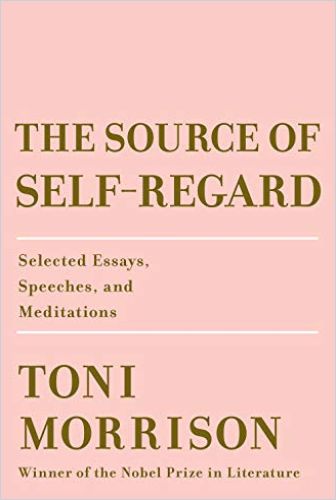American icon, Nobelist Toni Morrison, offers her views on literature, race, politics and creative writing.

Toni Morrison Speaks
Toni Morrison, a towering figure in American letters and winner of the 1993 Nobel Prize for literature – wrote, among other novels, Beloved – which won the Pulitzer Prize – The Bluest Eye, Song of Solomon, Sula and Jazz. This anthology gathers remarks from her various speeches and public appearances that provide a cross section of her unfettered views about race, politics, literature, love, social responsibility and her own creative processes.
Morrison, who died in 2019, gave American literature a singular, penetrating, profoundly moving voice. If you are compelled by Morrison’s thoughts here, you will also enjoy her novels, particularly Beloved, Sula and Jazz. Her artistry enabled her to disappear into her work. Even diligent readers are more likely to lose themselves in her stories and characters than to look for the presence of the author in her tales. That makes this compilation of Morrison’s direct statements about her philosophy and insights all the more valuable.
“Racism and Fascism”
Morrison characterized racism and fascism as “twins,” and asserts that bigots make their enemies look like criminals. Both racists and fascists fear democratic processes and seek to throw out what they regard as bad elements, to privatize public services, and to blur the lines between business and government.
The genius of fascism is that any political structure can host the virus…Fascism talks ideology, but it is really just marketing.Toni Morrison
The author noticed that people focus on what seems foreign, and no longer see what they have in common. Morrison regretfully detailed how Black Americans find that their homeland, the United States, often treats them as foreigners.
“Othering”
In Morrison’s evaluation, historians and economists can’t imagine the “other.” She posited that race in public dialogue perpetuates stereotypes. “Black” in news headlines, the author stated, means “poor.” American culture produced the “othering” of Black Americans as unknowable, different and exotic, a people with no commonality with whites. Morrison found this tragic.
Sexist language, racist language, theistic language – all are typical of the policing languages of mastery and cannot, do not permit new knowledge.Toni Morrison
In 1998, Morrison exhorted Sarah Lawrence graduates to search for solutions instead of happiness. People constructed and taught racism, Morrison said, now they can deconstruct and unlearn it.
“World-As-Home”
Morrison described how she imagined worlds free of racial discrimination. She sought to build her literary and intellectual universe while not denying her perspective as a Black woman and not bogging down in racism. She maintained that race illuminates alienation, exile, forced labor and migration. Morrison imagined a “world-as-home” where anyone can walk without fear.
Excluding Race
The traditional US literary canon, Morrison discerned, features the thoughts, pronouncements and philosophies of white men, and is often sexist and racist. Morrison cites Herman Melville – author of Moby Dick – who remarked that “the power of blackness” besets all romance. Early American writers exercised their imagination about a Black population that evoked their fears and conflicts – a population full of dramas and flaws, but, Morrison noted, with no freedom or rights.
No more apologies for a bleeding heart when the opposite is no heart at all. Danger of losing our humanity must be met with more humanity. Toni Morrison
Morrison argued for a central place in US history for the African-American experience – as Blacks and whites lived it – and for a full integration of African-American works into American literature.
Heaven and Hell
All Edens are exclusive, Morrison observed – places only the worthy may enter. This applies to middle-class neighborhoods that won’t share streets or public spaces. The problem from a literary point of view, she maintained, is that hell and evil are more glamorous, more entertaining and easier to write about than heaven and goodness. If Paradise is the absence of evil, then it has no boundaries and, therefore, Morrison realized, little drama.
Jazz and Imagination
Morrison wrote The Bluest Eye because in the early 1960s no stories or even statistics existed about young girls of color. In Sula, she studied female friendships. In Beloved, Morrison explored the idea of bodily autonomy, particularly in the context of slavery.
Conflict is a condition of intellectual life, and, I believe, its pleasure. Firing up the mind to engage itself is precisely what the mind is for.Toni Morrision
Before she began a novel, Morrison said she needed clarity about three elements: its structure, sound and palette. The sounds in her novels add emphasis to the language she used. She believed that jazz and imagination gave African-Americans new places from which to develop self-regard – though, the author reminds the reader, American Blacks have little political or economic power.
A Singular Voice
Morrison’s articulate spoken presentation of her own artistic approach, of her political and cultural insights, and of her perceptive, lucid commentary on racism in America are as poetic as her prose. She always speaks with great compassion and a refusal to embrace bitterness or cynicism. Her words will inspire, provoke tears, and help readers view America and their own literary experiences with new insight. Steadily forthright, kind, self-aware and determined, Morrison offers inspiration to any artist, new insights for her devoted readers, unsentimental insights about the romance and flaws of America, and a personal overview of her astounding career. Those who know and love Morrison’s work will welcome this intimate self-portrait and those who have yet to read her books will likely race to begin.






